|
FNCA Mutation Breeding Sub-Project Meeting on Disease Resistance in Banana took place as follows,
Date: July 25 - 28, 2006
Venue: Philippine Nuclear Research Institute (PNRI), Quezon City, Philippines
University of the Philippines Los Banos, Laguna, Philippines
Host Organizations:
Philippine Nuclear Research Institute (PNRI), Philippines
Crop Science Cluster- Institute of Plant Breeding, UP Los Banos, College, Laguna, Philippines Ministry of Education, Culture, Sports, Science and Technology (MEXT) of Japan
In Cooperation with: Japan Atomic Industrial Forum Inc. (JAIF)
Participants: 1 each from Indonesia , Malaysia and Vietnam , 3 from Japan , and 3 from the Philippines , total 9
Opening Ceremony:
The opening ceremony began with the welcome remarks by Ms. Virginia S. Calix, Chief, Atomic Energy Division, PNRI followed by the remarks of Dr. Hitoshi Nakagawa, Project Leader of Japan. Ms. Avelina G. Lapade, Project Leader of the Philippines introduced the participants and the opening ceremony was highlighted by the inspirational message of Dr. Alumanda M. Dela Rosa, Director of PNRI.
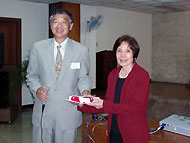 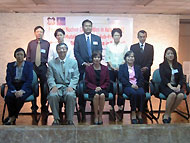
Session 1: Progress Reports on Disease Resistance in Banana
Progress Reports on Disease Resistance in Banana were delivered by Indonesia, Malaysia, Philippines and Vietnam. The presentations of progress reports are summarized in the attachment III.
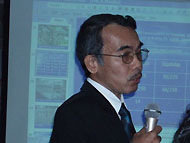 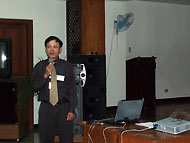
Session2: Midterm Report
Midterm reports were presented by each country. The points discussed and agreed upon are presented in the attachment IV.
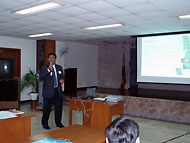 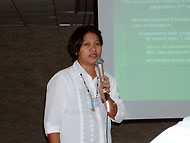
Session 3: Special Lecture
Welcome remarks by Dr. Jose E. Hernandez, Director, CSC-IPB was delivered.
Four Special Topics were presented by Japan and the Philippines as follows. The details of presentations are summarized in “Minutes of Meeting” .
- “ Detection and Identification of Resistant Banana Viruses for Banana Breeding” by Dr. Keiko Natsuaki
- “Development of New Cultivars by Mutation Breeding: Gamma-ray - Gene - Mutation” by Dr. Hitoshi Nakagawa
- “Identification of Fusarium wilt disease and evaluation of resistance in banana” by Ms. Conception E. Soguilon
- “Gene specific markers for mutation analysis” by Dr. Haydee F. Galvez
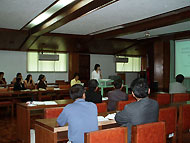 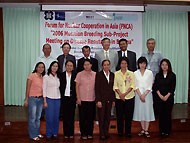
Session4: Methodologies/Techniques Demonstration
Greenhouse screening technique for BBTV using aphid inoculation was demonstrated to participants. Also, culturing of nematode, Radopholus similis on carrot disc was demonstrated. Evaluation of tissue cultured banana for nematode resistance in the greenhouse was discussed. Methods for evaluation for resistance to Fusarium wilt and banana bunchy top virus were standardized (see the attachment IV ).
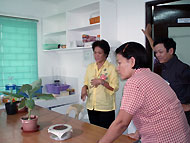 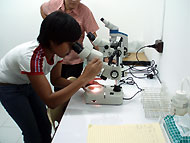
Session 5: Review and Discussion of Work Plan
The work plan set in 2005 was reviewed and formulated up to 2008 as in the attachment V .
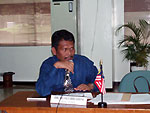 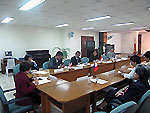 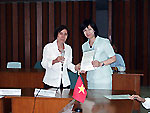
Laboratory Visit :
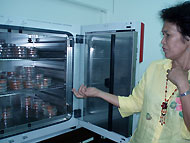
The participants visited the Molecular Genetics Laboratory and Tissue Culture Laboratory of the IPB. The on-going activities for each laboratory were presented.
Field Visit:
The demonstration field trial of the different introduced and local banana cultivars was visited. The participants were introduced to the different banana cultivars. This demo field trial is funded by INIBAP and Department of Agriculture-Bureau of Agricultural Research.
The participants visited two banana farms in Cavite province. The first was a small farm (0.7 ha) and backyard-type. The cultivar planted in the area was Cuarenta Dias. The presence of BBTV and Sigatoka was observed. In the second farm (about 0.5ha) tissue cultured cv Lakatan was planted under coconut. The farmer applied recommended cultural practices like fertilization, deleafing of infected leaves to control Sigatoka, weeding and bagging of fruits. The farm was a demonstration trial for banana growers to rescue the Lakatan industry in Cavite. This demo farm was supported by PCARRD, UPLB, Cavite State University (CaSU). The participants also visited a market where different cultivars of banana eg. Cuarenta Dias, Lakatan and Latundan, are sold.
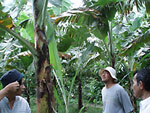 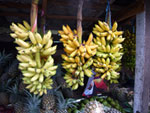 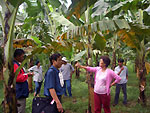
Minutes of
Sub-Project Meeting on Disease Resistance in Banana
July 25 - 28, 2006
Quezon City, Philippines
FNCA Mutation Breeding Sub-Project Meeting on Disease Resistance in Banana took place as follows,
Date: July 25 - 28, 2006
Venue: Philippine Nuclear Research Institute (PNRI), Quezon City, Philippines
University of the Philippines Los Banos, Laguna, Philippines
Host Organizations:
Philippine Nuclear Research Institute (PNRI), Philippines
Crop Science Cluster- Institute of Plant Breeding, UP Los Banos, College, Laguna, Philippines
Ministry of Education, Culture, Sports, Science and Technology (MEXT) of Japan
In Cooperation with: Japan Atomic Industrial Forum Inc. (JAIF)
Participants: 1 each from Indonesia, Malaysia and Vietnam, 3 from Japan, and 3 from the Philippines, total 9
Opening Ceremony:
The opening ceremony began with the welcome remarks by Ms. Virginia S. Calix, Chief, Atomic Energy Division, PNRI followed by the remarks of Dr. Hitoshi Nakagawa, Project Leader of Japan. Ms. Avelina G. Lapade, Project Leader of the Philippines introduced the participants and the opening ceremony was highlighted by the inspirational message of Dr. Alumanda M. Dela Rosa, Director of PNRI .
Session 1: Progress Reports on Disease Resistance in Banana
Progress Reports on Disease Resistance in Banana were delivered by Indonesia, Malaysia, Philippines and Vietnam. The presentations of progress reports are summarized in the attachment III.
Session2: Midterm Report
Midterm reports were presented by each country. The points discussed and agreed upon are presented in the attachment IV.
Session 3: Special Lecture
Welcome remarks by Dr. Jose E. Hernandez, Director, CSC-IPB was delivered.
Four Special Topics were presented by Japan and the Philippines . The summary of presentations is as follows;
- Dr. Keiko Natsuaki presented a lecture on “ Detection and Identification of Resistant Banana Viruses for Banana Breeding”. She pointed out that t he presence and unexpected infection to the test plants may affect resistant banana breeding programs. Thus, better understanding on banana viruses and an appropriate diagnosis are required. The use of multiple detection technologies helps accurate evaluation in selection of resistant bananas.
- Dr. Hitoshi Nakagawa presented a lecture on “Development of New Cultivars by Mutation Breeding: Gamma-ray - Gene - Mutation”. He introduced research activities of Institute of Radiation Breeding and summarized activities of FNCA Mutation Breeding Project.
- Ms. Conception E. Soguilon presented a lecture on “Identification of Fusarium wilt disease and evaluation of resistance in banana”. She mentioned that species of Fusaium isolated from Davao City that caused Fusarium wit in banana growing areas was identified into groups and races 1, 2 and 4 using vegetative compatibility grouping (VCG). The screening procedure used for evaluation of resistance of local and introduced banana cultivars was done using the INIBAP protocol. Identification of resistance or susceptibility to Fusarium wilt was done. The BPI-DNCRDC was involved in the evaluation of materials for the IMTP for the Fusarium wilt in hot spots.
- Dr. Haydee F. Galvez presented a lecture on “Gene specific markers for mutation analysis”. She discussed the different molecular markers and their features as applied to mutation breeding. Identification of resistance gene specific to tomato against bacterial wilt using RGA markers was done. Field evaluation for resistance to bacterial wilt in tomato mutant lines based on phenotypes and molecular markers was conducted. Genome-wide mutation analysis of radiated and tissue cultured avocado was done using SSR markers.
Session4: Methodologies/Techniques Demonstration
Greenhouse screening technique for BBTV using aphid inoculation was demonstrated to participants. Also, culturing of nematode, Radopholus similis on carrot disc was demonstrated. Evaluation of tissue cultured banana for nematode resistance in the greenhouse was discussed. Methods for evaluation for resistance to Fusarium wilt and banana bunchy top virus were standardized (see the attachment IV ).
Session 5: Review and Discussion of Work Plan
The work plan set in 2005 was reviewed and formulated up to 2008 as in the attachment V .
Laboratory Visit :
The participants visited the Molecular Genetics Laboratory and Tissue Culture Laboratory of the IPB. The on-going activities for each laboratory were presented.
Field Visit:
The demonstration field trial of the different introduced and local banana cultivars was visited. The participants were introduced to the different banana cultivars. This demo field trial is funded by INIBAP and Department of Agriculture-Bureau of Agricultural Research.
The participants visited two banana farms in Cavite province. The first was a small farm (0.7 ha) and backyard-type. The cultivar planted in the area was Cuarenta Dias. Aside from banana, the area was planted with other crops like coffee, taro and yam. The presence of BBTV and Sigatoka was observed. The farmer does not apply fungicides to control diseases. Occasional weeding was done and application of ammonium sulfate was done three times a year. Planting of coffee was done together with banana as additional source of income. In the second farm (about 0.5ha) tissue cultured cv Lakatan was planted under coconut. The farmer applied recommended cultural practices like fertilization, deleafing of infected leaves to control Sigatoka, weeding and bagging of fruits. Drainage canals were provided in the farm. The farm was a demonstration trial for banana growers to rescue the Lakatan industry in Cavite . This demo farm was supported by PCARRD, UPLB, Cavite State University (CaSU). The participants also visited a market where different cultivars of banana eg. Cuarenta Dias, Lakatan and Latundan, are sold.
The Minutes were discussed and agreed upon by all participants in the Meeting. This will be reported at the FNCA 2006 Mutation Breeding Workshop to be held on 11-15 September 2006 in Takasaki , Japan .
Attachments
- Program
- Participants List
- Summary of Progress Reports
- Midterm Report
- Work Plan
Program of
Sub-Project Meeting on Disease Resistance in Banana
July 25 - 28, 2006
Quezon City, Philippines
|
|
|
|
| July 25 |
|
|
|
A.M.
|
|
|
|
| 8:15 |
: |
Leave for PNRI |
| 9:00 |
: |
Opening Ceremonies |
| |
|
Welcome Remarks |
- Ms. Virginia S. Calix, Chief, Atomic Research Division, Research Division Division, PNRI |
| |
|
Remarks - |
Dr. Hitoshi Nakagawa, Director, Institute of Radiation Breeding (IRB), National Institute of Agrobiological Sciences (NIAS) |
| |
|
Introduction of Participants - |
Ms. Avelina G. Lapade, PNRI |
| |
|
Inspirational Message - |
Dr. Alumanda M. dela Rosa Director, PNRI |
|
|
Group Picture Taking |
| 9:30 |
: |
Coffee Break |
| 9:40 |
: |
Session 1: Presentation of Progress Reports
Chair : Japan |
| 9:40-10:20 |
: |
Indonesia - Dr. Ishak |
| 10:20-11:00 |
: |
Malaysia - Dr. Rusli Ibrahim |
| 11:00-11:40 |
: |
Philippines - Dr. Olivia Damasco |
| 11:40-12:20 |
: |
Vietnam - Dr. Dang Trong Luong |
| 12:20 |
: |
Lunch |
| P.M. |
|
|
| 1:30 |
: |
Session 2: Mid Term Reports
Chair : Japan |
| 1:30-1:50 |
: |
Indonesia - Dr. Ishak
|
| 1:50-2:10 |
: |
Malaysia - Dr. Rusli Ibrahim |
| 2:10-2:30 |
: |
Philippines - Dr. Olivia Damasco |
| 2:30-2:50 |
: |
Vietnam - Dr. Dang Trong Luong |
| 2:50-3:00 |
: |
Break |
| 3:00-5:00 |
: |
Discussion |
| |
|
|
| July 26 |
|
|
A.M. |
|
|
| 8:00 |
: |
Arrival of Participants
|
| 8:30 |
: |
Registration |
| 9:00 |
: |
Welcome Remarks |
Dr. Jose E. Hernandez Director Crop Science Science- Institute of Plant Breeding Cluster College of Agriculture, UPLB |
|
| 9.20 |
: |
Session 3: Special Lecture
Chair : the Philippines |
| 9:20 |
: |
Identification and Detection of Banana Viruses for Resistant Banana Breeding - Dr. Keiko Natsuaki, TUA
|
| 10:00 |
: |
Identification of Fusarium wilt disease and evaluation of resistance in banana - Ms. Concepcion Soguilon, BPI-DNCRDC |
| 10:45 |
: |
Development of new cultivars by radiation breeding: gamma ray- gene- mutation - Dr. Hitoshi Nakagawa, IRB, NIAS |
| 11:30 |
: |
Identification and application of molecular markers for disease resistance in tomato using DNA mapping techniques - Dr. Haydee Galvez, CS-IPB |
| 11:30 |
: |
Open Forum |
| 12:00 |
: |
Lunch |
| P.M. |
|
|
| 1:30 |
: |
Session 4: Techniques Demonstration
Chair : the Philippines |
| 2:30 |
: |
Visit to IPB Laboratories
National Plant Genetic Resource Laboratory
Bio-Genetics Laboratory
|
| 4:30 |
: |
Field Visit |
| |
|
|
| July 27 |
|
|
| A.M. |
|
|
| 7:00 |
: |
Leave for Tagaytay City
|
| 9:00 |
: |
Visit to Banana Plantation/Small scale Farms, Market |
| P.M. |
|
|
| 4:00 |
: |
Back to Manila |
| |
|
|
| July 28 |
|
|
A.M. |
|
|
9:00 |
: |
Session 5: Review and Discussion of Work Plan
Chair : Malaysia
|
| |
|
Review of Work Plan set in 2005 and Planning of Work Plan up to 2008 |
| 11:00 |
: |
Drafting of Minutes of Workshop
Chair : Japan |
| 12:00 |
: |
Lunch |
| P.M. |
|
|
| 1:30 |
: |
Continue Drafting of Minutes |
| 5:00 |
: |
Closing of Workshop |
Participants List of
Sub-Project Meeting on Disease Resistance in Banana
July 25 - 28, 2006
Quezon City, Philippines
No.
|
Country
|
Name/Designation
|
| 1. |
INDONESIA
|
Dr. Ishak
Principle Scientist
Plant Breeding and Biotechnology Section
R&D Center for Isotopes and Radiation Technology (CRDIRT)
National Nuclear Energy Agency (BATAN) |
| 2. |
JAPAN
|
Dr. Hitoshi Nakagawa
Director
Institute of Radiation Breeding (IRB)
National Institute of Agrobiological Sciences (NIAS) |
| 3. |
JAPAN
|
Dr. Keiko Natsuaki
Professor
Faculty of International Agriculture and Food Studies
Tokyo University of Agriculture |
| 4. |
JAPAN
|
Ms. Yuko Wada
Senior Staff,
Asia Cooperation Center (ACC)
Japan Atomic Industrial Forum (JAIF) |
| 5. |
MALAYSIA
|
Dr. Rusli Ibrahim
Manager
Industrial Crop Group
Agrotechnology and Biosciences Division
Malaysian Institute for Nuclear Technology Research (MINT) |
| 6. |
THE PHILIPPINES
|
Ms. Avelina Gutierrez Lapade
Supervising Science Research Specialist and Head
Agricultural Research Section / Atomic Research Division
Philippine Nuclear Research Institute (PNRI) |
| 7. |
THE PHILIPPINES
|
Dr. Olivia Damasco
Professor
Plant Pathology Laboratory
Institute of Plant Breeding (IPB)
University of the Philippines at Los Banos (UPLB) |
| 8. |
THE PHILIPPINES
|
Dr. Teodora Ocampo Dizon
Research Associate Professor
Plant Pathology Laboratory
Institute of Plant Breeding (IPB)
University of the Philippines at Los Banos (UPLB) |
| 9. |
VIETNAM
|
Dr. Dang Trong Luong
Head
Genetics and Upland Crop Breeding Dept.
Agricultural Genetic Institute
Ministry of Agricultural and Rural Dev. |
|